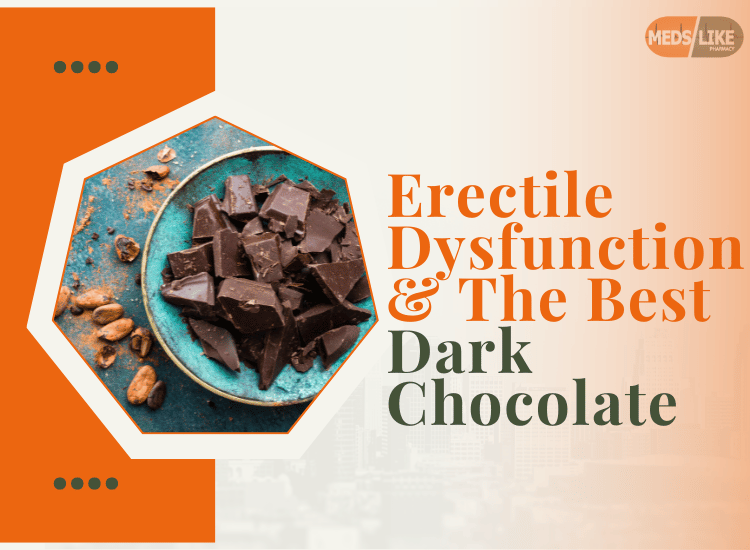Erectile dysfunction (ED) affects millions of men globally Dark Chocolate, interfering with their ability to achieve or maintain an erection firm enough for satisfactory sexual performance. While pharmaceutical treatments such as sildenafil (Viagra), tadalafil (Cialis), and other PDE5 inhibitors remain the gold standard for managing ED, many men are also seeking natural, holistic options to improve sexual health. One surprising contender gaining attention is dark chocolate.
Rich in flavonoids and other beneficial compounds, dark chocolate is often touted for its cardiovascular benefits. But can this sweet indulgence actually help with erectile dysfunction? Let’s explore the connection between dark chocolate and male sexual performance, what science says about it, and how to choose the best dark chocolate for optimal results.
Understanding Erectile Dysfunction
Erectile dysfunction is a complex condition that may be caused by a range of physical and psychological factors, including:
- Poor blood flow
- Diabetes
- Hypertension
- Obesity
- High cholesterol
- Anxiety, stress, or depression
- Hormonal imbalances
- Smoking and excessive alcohol use
Because erections depend on good blood flow, any condition that impairs circulation can potentially affect sexual performance. This is where lifestyle and dietary factors come into play.
Dark Chocolate and Sexual Health: The Science
Dark chocolate is made from cacao beans, which are rich in flavanols, a type of flavonoid with potent antioxidant and anti-inflammatory properties. Flavanols have been shown to improve cardiovascular health by:
- Enhancing nitric oxide (NO) production
- Reducing blood pressure
- Improving vascular function
- Decreasing LDL cholesterol
- Increasing insulin sensitivity
So, what does this have to do with erections?
Nitric Oxide: The Link to Erections
Erections are heavily dependent on nitric oxide, a molecule that relaxes the blood vessels and promotes increased blood flow to the penis. This mechanism is the same one targeted by popular ED drugs, which work by enhancing nitric oxide’s effects in the body.
Studies suggest that dark chocolate with a high cacao content can stimulate nitric oxide production, potentially enhancing circulation—including to the penile arteries. Improved blood flow may help some men achieve firmer and more sustainable erections.
Scientific Evidence: Is It Real?
Although clinical trials directly linking dark chocolate consumption to improved erectile function are limited, several studies support its cardiovascular and vascular benefits:
- A 2007 study published in JAMA found that flavanol-rich dark chocolate lowered blood pressure and improved insulin sensitivity in healthy adults.
- A 2014 review in The American Journal of Clinical Nutrition concluded that cocoa flavanols have a positive effect on endothelial function, which is crucial for erection quality.
- Research published in Circulation demonstrated that flavanols can improve blood flow in peripheral arteries, which may also benefit sexual performance.
While these findings are promising, it’s important to remember that dark chocolate isn’t a cure for ED, but rather a potentially supportive dietary addition to a broader treatment strategy.
Choosing the Best Dark Chocolate for ED
Not all chocolate is created equal. The type and quality of dark chocolate you choose matters, especially when using it for health benefits.
What to Look for:
- High Cacao Content (70% or higher): The higher the cacao percentage, the more flavonoids and less sugar.
- Low Sugar Content: Excess sugar can contribute to weight gain, diabetes, and insulin resistance—factors that worsen ED.
- Minimal Additives: Choose dark chocolate with minimal processing and no added artificial ingredients.
- Organic and Fair Trade Options: These products tend to be purer and more ethically sourced.
Top Recommended Brands (as of 2024):
- Lindt Excellence 85% Cocoa
- Green & Black’s Organic Dark Chocolate 70–85%
- Alter Eco Deep Dark Blackout 85%
- Endangered Species 88% Cocoa
- Ghirardelli Intense Dark 86%
Always check the label for cacao percentage and avoid options with milk solids or high fructose corn syrup.
How Much Dark Chocolate Should You Eat?
Moderation is key. Even the healthiest dark chocolate is calorie-dense and can contribute to weight gain if consumed excessively.
Recommended intake:
- 1 to 1.5 ounces (30–40 grams) per day is considered safe and potentially beneficial.
- Divide it into smaller portions and combine with a healthy diet rich in fruits, vegetables, lean proteins, and whole grains.
Dark Chocolate + Healthy Habits = Better Sexual Health
Incorporating dark chocolate into your routine can be part of a broader lifestyle approach to managing or preventing erectile dysfunction. Consider combining it with the following changes:
- Exercise regularly: Aerobic activity improves blood flow and testosterone levels.
- Lose excess weight: Obesity is a major risk factor for ED.
- Quit smoking and reduce alcohol intake
- Manage stress and mental health
- Control chronic conditions: Especially diabetes and high blood pressure
When to See a Doctor
If you’re experiencing ongoing erectile dysfunction, it’s essential to talk to a healthcare provider. ED can be an early warning sign of underlying cardiovascular disease, diabetes, or hormonal imbalance. While dark chocolate may offer supplementary support, it should never replace professional medical evaluation and treatment.
Final Thoughts
While it may sound too good to be true, dark chocolate—especially the kind rich in flavonoids—may offer some cardiovascular and circulation benefits that support sexual health. Thanks to its potential to boost nitric oxide production, improve blood vessel function, and reduce inflammation, dark chocolate could be a small yet satisfying addition to your ED management plan.
Remember: Dark chocolate is not a miracle cure, but in moderation, it can be part of a delicious and heart-healthy lifestyle that supports better performance and overall well-being.
Disclaimer: This blog is for informational purposes only and should not replace professional medical advice. Always consult your doctor before making changes to your diet or starting any new treatment for erectile dysfunction.

